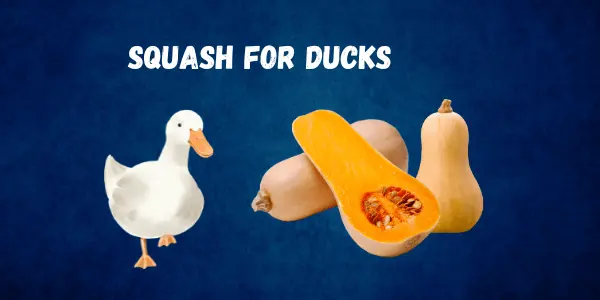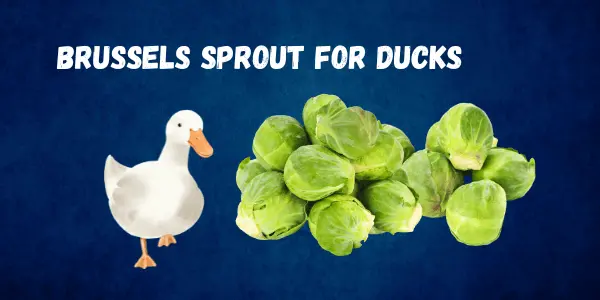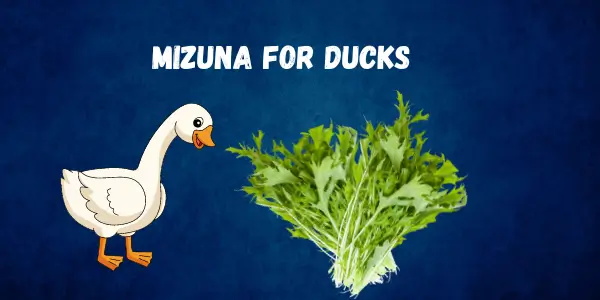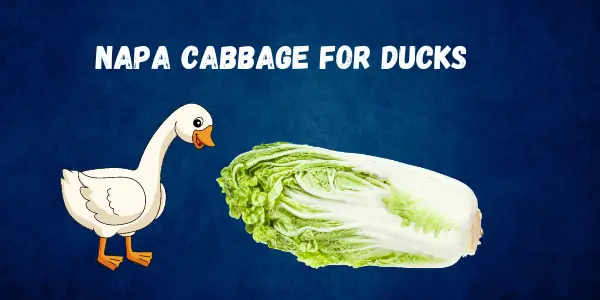Can Ducks Eat Pumpkin? Discover the Benefits for Your Flock Today! Learn More
Published: 13 Sep 2024
Yes, ducks can eat pumpkin. It is a safe and nutritious food when fed in moderation. Both raw and cooked pumpkin can be included in a duck’s diet, providing essential nutrients. However, certain parts, like seeds and skin, require preparation to ensure safe consumption.
Can Ducks Eat Pumpkin – Is Pumpkin Safe for Ducks?
Pumpkin is generally safe for ducks as long as it is fresh and unseasoned. It contains fiber, vitamins, and minerals that support a duck’s health. However, feeding too much pumpkin can lead to digestive issues. Ducks should also have access to fresh drinking water when eating fibrous foods like pumpkin.

Nutritional Benefits of Pumpkin for Ducks
Pumpkin is a good source of essential nutrients that benefit ducks, including:
- Fiber – Supports digestion and helps prevent crop impaction.
- Vitamin A – Important for maintaining healthy vision and immune function.
- Beta-Carotene – Acts as an antioxidant and contributes to feather health.
- Potassium – Helps regulate fluid balance and muscle function.
- Low Calories – Provides a nutritious treat without excessive fat.
Feeding pumpkin in small amounts can be a good way to diversify a duck’s diet while ensuring they receive beneficial nutrients.
Potential Risks of Feeding Pumpkin to Ducks
While pumpkin is safe for ducks, there are a few risks to consider:
- Crop Impaction – Feeding large amounts of fibrous pumpkin without proper hydration may lead to digestive blockages.
- Unripe or Moldy Pumpkin – Ducks should not eat spoiled or moldy pumpkin, as it can cause illness.
- Canned Pumpkin with Additives – Some canned pumpkin products contain sugar, salt, or preservatives that are not safe for ducks.
Ducks should only eat fresh, plain pumpkin in controlled amounts to avoid these risks.
Types of Pumpkin Ducks Eat
| Types of Pumpkin Ducks Eat |
|---|
|
Ducks can eat different parts of a pumpkin, but preparation is important. The flesh, seeds, and skin each have different benefits and potential concerns. Can Ducks Eat Pumpkin Seeds?Yes, ducks can eat pumpkin seeds. These seeds are rich in healthy fats and protein, making them a nutritious treat. However, they should be given in moderation, as too many seeds can contribute to fatty liver disease in ducks. Are Pumpkin Seeds Safe for Ducks?Pumpkin seeds are safe for ducks if properly prepared. However, whole, unhulled seeds can be difficult to digest, especially for smaller ducks. Large amounts of seeds may also cause crop impaction if ducks do not have enough water to aid digestion. How to Prepare Pumpkin Seeds for DucksTo make pumpkin seeds easier for ducks to consume, follow these steps:
When fed correctly, pumpkin seeds can be a great addition to a duck’s diet, providing digestible proteins and healthy fats. Can Ducks Eat Cooked Pumpkin?Yes, ducks can eat cooked pumpkin. Cooking softens the flesh, making it easier for ducks to eat and digest. However, it should be plain, without added seasonings, sugar, or oils. Raw vs. Cooked Pumpkin for Ducks
Both raw and cooked pumpkin are safe, but cooked pumpkin should not contain added ingredients. Best Ways to Serve Cooked Pumpkin to Ducks
Can Ducks Eat Canned Pumpkin?Ducks can eat canned pumpkin, but only if it is 100% pure pumpkin without added ingredients. Many canned pumpkin products contain preservatives, sugar, or spices that are not safe for ducks. Ingredients to Watch Out for in Canned Pumpkin
Always check the label to ensure the canned pumpkin is free from these additives. How to Safely Feed Canned Pumpkin to Ducks
Canned pumpkin can be a convenient option, but fresh or cooked pumpkin is generally the better choice. |
How Much Pumpkin Can Ducks Eat?
Pumpkin should be an occasional part of a duck’s diet, not a primary food source. While it provides beneficial nutrients, feeding too much can lead to digestive issues due to its high fiber content. Ducks need a balanced diet that includes grains, vegetables, and proteins.
Recommended Serving Sizes
- Small Ducks – 1-2 tablespoons of pumpkin per feeding.
- Large Ducks – Up to ¼ cup of pumpkin per feeding.
- Ducklings – Only small, mashed portions mixed with regular feed.
Serving sizes should be adjusted based on the duck’s overall diet and food variety.
How Often Should Ducks Eat Pumpkin?
- Occasional Treat – 2-3 times per week is ideal.
- Avoid Overfeeding – Too much pumpkin can lead to loose droppings.
- Balanced Diet – Should be combined with other foods like grains and leafy greens.
Providing pumpkin in moderation ensures ducks get nutritional benefits without disrupting their digestion.
Best Ways to Feed Pumpkin to Ducks
Ducks can eat pumpkin in different ways, but preparation is important to ensure they can consume it safely and get the most nutritional value.
Mixing Pumpkin with Other Foods
- Combine with Grains – Mixing pumpkin with duck feed or grains like rice or oats creates a balanced meal.
- Add to Vegetable Mixes – Chopped pumpkin pairs well with leafy greens and other duck-safe vegetables.
- Include Pumpkin Seeds Sparingly – A few crushed seeds can provide extra nutrients but should be limited to prevent excessive fat intake.
Mixing pumpkin with other foods prevents dietary imbalances and helps ducks enjoy a variety of textures and flavors.
Pumpkin as a Seasonal Treat
- Ideal Fall Treat – Pumpkin is most available in autumn, making it a fresh and nutritious seasonal food.
- Great for Extra Hydration – Its high water content helps keep ducks hydrated in dry weather.
- Use Fresh or Cooked – Fresh pumpkin or lightly cooked pumpkin can be offered during molting seasons for added vitamins.
Offering pumpkin occasionally as part of a well-rounded diet ensures ducks receive its benefits without digestive problems.
What Parts of the Pumpkin Can Ducks Eat?
| What Parts of the Pumpkin Can Ducks Eat? |
|---|
|
Ducks can eat multiple parts of the pumpkin, but some require preparation to ensure safe consumption. While the flesh is the most commonly fed part, the skin, seeds, and leaves can also be included in small amounts. Can Ducks Eat Pumpkin Flesh?Yes, ducks can eat pumpkin flesh. It is the most nutritious and easily digestible part. The soft texture, especially when cooked, makes it easier for ducks to consume. However, it should be given in moderation to prevent digestive issues.
Raw or cooked pumpkin flesh is safe, but avoid any added seasonings or sugar. Can Ducks Eat Pumpkin Skin and Rind?Ducks can eat pumpkin skin and rind, but they are tougher and harder to digest. Small, thin-skinned pumpkins are easier for ducks to consume than large, thick-rind varieties.
If ducks struggle to eat the skin, it is best to remove it and only feed them the flesh. Can Ducks Eat Pumpkin Leaves and Vines?Pumpkin leaves and vines are technically edible for ducks, but they are fibrous and not the best option for regular feeding.
While ducks may nibble on leaves if available, they should not be a major part of their diet. |
Can Ducklings Eat Pumpkin?
Ducklings can eat pumpkin, but their digestive systems are more sensitive than adult ducks. It should be introduced carefully and in small amounts.
Nutritional Needs of Ducklings
Ducklings require a diet high in protein and essential vitamins for healthy growth. While pumpkin provides fiber and vitamin A, it should not replace their main feed.
- Protein is Essential – Ducklings need high-protein starter feed for proper development.
- Limited Fiber – Too much fiber can interfere with nutrient absorption.
- Supports Hydration – The high water content in pumpkin helps keep ducklings hydrated.
Pumpkin can be an occasional supplement, but their diet should primarily consist of formulated duckling feed.
Safe Ways to Introduce Pumpkin to Ducklings
- Mash or Puree the Pumpkin – Ensures easy digestion.
- Mix with Starter Feed – Helps maintain a balanced diet.
- Start with Small Portions – Introduce gradually to prevent digestive issues.
- Monitor for Reactions – If ducklings show signs of loose droppings, reduce or stop feeding pumpkin.
Feeding pumpkin sparingly to ducklings can provide variety, but it should never replace essential high-protein feeds needed for their growth.
Signs of Overfeeding Pumpkin to Ducks
While pumpkin is a nutritious treat, excessive amounts can cause health issues. Ducks need a balanced diet, and too much fiber from pumpkin can lead to digestive discomfort. Monitoring their behavior and droppings can help identify signs of overfeeding.
Crop Impaction Risks
Ducks store food in their crop before digestion. Overeating fibrous foods like pumpkin, especially if combined with seeds or tough skin, can lead to crop impaction.
- Symptoms of Crop Impaction:
- Swollen or hard crop
- Lack of appetite
- Frequent head shaking
- Reduced energy levels
If a duck’s crop remains full and hard for long periods, they may need dietary adjustments or veterinary care. Providing fresh drinking water and feeding pumpkin in small amounts can help prevent impaction.
Digestive Issues and Watery Vomit
Too much pumpkin can disrupt a duck’s digestion, leading to loose droppings or watery vomit. Ducks need a variety of foods to maintain gut health, and excessive pumpkin can throw off their nutrient balance.
- Signs of Digestive Problems:
- Loose or watery droppings
- Frequent regurgitation
- Lethargy or discomfort after eating
If ducks show these signs, reduce pumpkin intake and provide more grains and proteins to restore balance. Ensuring access to fresh water also helps digestion.
Conclusion
Ducks can safely eat pumpkin, including the flesh, seeds, and even skin in moderation. It provides essential nutrients like fiber and vitamin A, making it a healthy occasional treat. However, overfeeding can lead to crop impaction and digestive issues.
To keep ducks healthy:
- Feed pumpkin in small, controlled portions.
- Avoid canned pumpkin with additives.
- Ensure a balanced diet with grains, proteins, and fresh vegetables.
- Provide fresh water to aid digestion.
When fed correctly, pumpkin can be a nutritious seasonal addition to a duck’s diet without causing health problems.

- Be Respectful
- Stay Relevant
- Stay Positive
- True Feedback
- Encourage Discussion
- Avoid Spamming
- No Fake News
- Don't Copy-Paste
- No Personal Attacks

- Be Respectful
- Stay Relevant
- Stay Positive
- True Feedback
- Encourage Discussion
- Avoid Spamming
- No Fake News
- Don't Copy-Paste
- No Personal Attacks





